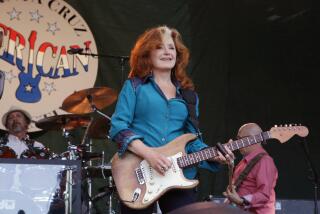A Band To Adore
- Share via
You had to feel good about the Smashing Pumpkins’ concert Wednesday night at the Universal Amphitheatre even before the first note was played.
As they’re doing on all stops on a 13-city North American tour, which focuses almost entirely on songs from the band’s new album, “Adore,” the Pumpkins donated their full share of ticket receipts for the show (and another Thursday at Universal) to a local charity.
That’s quite different from the more common practice in rock of donating only net proceeds or even the often ill-defined “a portion of the proceeds.” The result: More than $400,000 will be turned over to Five Acres, a Los Angeles County children’s aid society.
Altruism, however, wasn’t the only benefit of Wednesday’s frequently spectacular though sometimes oblique two-hour performance. Some fans surely missed the usual battery of hits, but others must have been enthralled by the chance to watch as Pumpkins leader Billy Corgan, one of rock’s most ambitious figures, reworked the album’s songs in ways so dramatic that the concert seemed like a musical workshop.
This is very much a band in transition, changing not only its tour lineup but also its sonic and thematic focus.
“Adore” is a difficult and demanding work, one that moves away from the youthful, guitar-driven anthems that established the Pumpkins as one of the premier bands of the ‘90s.
Corgan’s goal in the collection was to put down the guitar and songs of youthful anxiety to move into fresher and, hopefully, more mature territory.
There was plenty of motivation for this. He felt that the high-energy assault of ‘90s alternative-rock had grown stale. Plus, he had gone through trials in his personal life, including a divorce and the death of his mother.
Corgan and his bandmates, guitarist James Iha and bassist D’Arcy, also experienced the nightmare of seeing the keyboardist for the band’s 1996 “Mellon Collie and the Infinite Sadness” tour die of a drug overdose and, in connection, longtime drummer Jimmy Chamberlin arrested on drug possession charges. (The Pumpkins later fired him.)
But there was some brightness in Corgan’s life. Since the last album, the songwriter fell in love. And many songs on “Adore” deal with the extremes of the gains and losses he has experienced.
If the themes on “Adore” are more soul-searching, the music also is more experimental as Corgan tries to find in keyboards and percussion the dynamics that he has sacrificed in moving away from a guitar base.
In some ways, the feeling of transition in “Adore” is reminiscent of U2’s “The Unforgettable Fire” album, which proved to be a bridge between the Irish band’s “War” and “The Joshua Tree” periods. On “Adore,” Corgan also seems to be a man who still hasn’t found what he’s looking for.
It’s a point that he must recognize because the Pumpkins are returning to the studio after this short tour to begin working on their next album.
On Wednesday, though keyboardist Mike Garson contributed some lovely solo touches, the focus was on finding a balance between Corgan’s new fondness for heavy percussion and a restoration of the band’s trademark guitar glitter. To provide the percussion power, the band is carrying three musicians, anchored by ace veteran Kenny Arnoff.
The Pumpkins opened with “To Sheila,” the love song that begins “Adore,” but didn’t stick to the album sequence. They broke from the new material only occasionally, reprising hits such as “Tonight, Tonight.”
For all his strengths, Corgan has long shown a nagging inability to choose between what is essential and what is simply curious. It’s a problem that marred “Mellon Collie” and continues to surface in the 70-minute “Adore.”
When the songs escape his dreaded obliqueness, however, they can be captivating, both when he is talking about the loss of his mother (“For Martha”) or expressing faith in love (the graceful “Shame”).
Surprisingly, the evening’s defining moment was the reworked “Appels + Oranjes.” The song is immensely catchy on record, with its seductive synth beat, but it is so accessible that it seems too lightweight in the context of the album.
Live, the Pumpkins found a way to underscore the message of the song, which is the shedding of youthful innocence. The arrangement started off gently, as Corgan sang the kind of generic “what if” sentiments that have fueled a thousand pop songs.
Slowly, as the tune proceeds, the questioning becomes deeper and the musical textures underscore the sobering realization that the answers to more urgent, personal questions may not be positive.
It was during moments like that Wednesday that Corgan and the Pumpkins felt like they had crossed a bridge and found a balance between the music that made them stars and the music that will carry them forward.
More to Read
The biggest entertainment stories
Get our big stories about Hollywood, film, television, music, arts, culture and more right in your inbox as soon as they publish.
You may occasionally receive promotional content from the Los Angeles Times.










